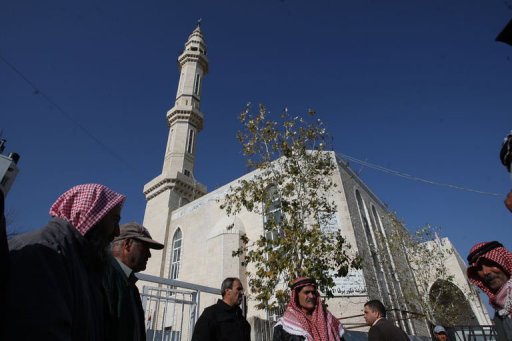
JERUSALEM — Extremist vandals on Thursday torched another mosque in the latest "price tag" reprisal attack as Israeli troops demolished part of an illegal settlement outpost in the northern West Bank.
It was the second time in as many days that attackers had tried to burn down a mosque and left Hebrew-language graffiti at the scene in a protest linked to state plans to dismantle a handful of wildcat settler outposts.
The attacks sparked an angry Palestinian response, with officials accusing the Israeli government of providing "impunity" to the extremists.
"Setting fire to the mosque is a declaration of war by the settlers against Palestinians," presidential spokesman Nabil Abu Rudeina told AFP.
And the Palestinian Authority said Israeli forces had done nothing "to prevent or punish the rising trend of settler violence."
"This policy encourages settler hate crimes against Palestinians and their places of worship," it said. "Such incidents have continued unabated while Israeli policies are providing impunity to those extremists."
Thursday's arson attempt targeted a mosque in Burqa village near Ramallah.
"Carpets and chairs in the women's section were partly burnt and on the wall was Hebrew graffiti saying 'The war has started'," said Mayor Abdelkader Abdeljalil.
The perpetrators also wrote "Mitzpe Yitzhar" on the walls, the name of the outpost which was partially dismantled by troops overnight, angering the settler community.
The attack took place 24 hours after extremists tried to torch a disused mosque in central Jerusalem, daubing racist anti-Arab graffiti on its walls in an act that drew sharp condemnation from Washington.
Despite a flurry of attacks on mosques and other Palestinian property in the past few days, debate in Israel has been focused squarely on an incident earlier this week when settlers attacked troops in the northern West Bank.
The assault angered Prime Minister Benjamin Netanyahu who on Wednesday announced new measures against Jewish "rioters" who attack security forces.
Under the new regulations, the army and police will now have the authority to detain offenders, and they can be tried in military courts as well as civilian courts.
Security forces will also be able to put offenders in administrative detention, in which a person can be held without charge for an unspecified length of time, and there will be more orders barring individuals from the West Bank.
"Those who raise a hand against Israeli soldiers or police will be punished severely," Netanyahu said, although he stopped short of adopting a ministerial recommendation to classify them as "terrorists."
The Burqa mosque attack coincided with an Israeli army operation to dismantle two structures in the Mitzpe Yitzhar settler outpost near Nablus.
Troops demolished a house and a goat shed, which were built on private Palestinian land, to comply with a Supreme Court order to remove them by the end of the year.
A rightist activist arrested on Thursday morning for allegedly spraying the words "price tag" and "Nazi" on the walls of a military post in the West Bank was charged during the afternoon in a civilian court, Israeli news website Ynet said, citing it as an example of new-look speedy proceedings.
The army confirmed that "graffiti was sprayed" at the post in Tapuah junction, about five kilometres (three miles) south of Mitzpe Yitzhar, and that a suspect was handed over to police. It did not give further details.
Settler activists had hoped to prevent the Mitzpe Yitzhar demolitions but appeared to be taken by surprise, with troops reportedly entering the area via a Palestinian village, then declaring the outpost a closed military zone.
Police said there were no reports of any disturbances.
Avraham Binyamin, a spokesman for the community, told AFP that the residents would respond to the demolitions with further construction activities.
"We are not involved in acts of violence against the army," he said. "We are going to build. That is the answer of the Jewish settlement movement."
Israel considers settlement outposts built without government approval to be illegal and often sends security personnel to demolish them. They usually consist of little more than a few trailers.
But the international community considers all settlements built in the West Bank, including east Jerusalem, to be illegal.




